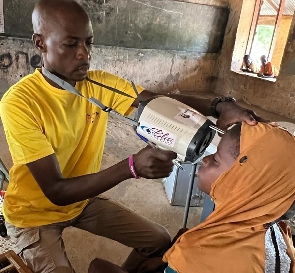Dr. Zakarea Al-Hasan Balure, an optometrist in the Wa Municipality of the Upper West Region is calling on the public to take proper care of their eyes since the human eye is irreplaceable as it cannot be bought on the market when lost.
He calls on the public to adhere to precautionary measures of keeping the eyes safe such as protecting one's eyes during work, staying away from self-medication and monitoring their kids to ensure they do not engage in dangerous games that can injure their eyes and the need to consume good food that has the required vitamins to protect and nourish the eyes.
"As usual as my statement always is, eyes are not sold on the market, it's not sold anywhere. God gave us two eyes and I don't think any of us is ready to lose even one. All the precautions we have always been talking about, please and please, adhere to them. Eat well, and use protective gadgets for your eyes especially goggles when you're cutting things, spraying, and so on. Don't self-medicate the eyes or apply traditional medications. And I repeat don't just eat, eat well. Don't just fill your stomach eat what will help the eyes, (like) the vitamins, they're all important.
"Stop children from using sticks as toys to play, shootings and others. Now, that's causing a lot of havoc (to children). Some pierce their eyes with it among others. So as much as possible, don't play with your eyes. Eyes are really delicate and we don't have spare parts for your eyes," he cautioned.
He said this in an exclusive interview with this reporter on Thursday, June 29, 2023, when he sought to find out the proper way of protecting and keeping the eyes safe.
On which eye disorders patients often turn up at his outfit with, Dr. Zakarea identified conjunctivitis as basically the one that patients come with but added that his "main thing" is, however, the refractive errors.
"Basically, it is conjunctivitis which is the allergic and the infective, that's basically what we term as "apolo" over here. Because of our terrain, our climate pronounces all that. But my main thing is actually the refractive errors. With much education now, people are now aware that a case where children who could not see and were dropping out of school is now no more. They're being brought in and we look at them, give them the appropriate glasses and they're now seeing. The man who at 40 cannot suddenly read his newspapers, his books, cannot really work on his desk, and beginning to talk about retirement is now a thing of the past," he noted.
When asked about the recommended time to go for eye check-ups, the optometrist stated that: "We advocate for annual eye check-ups. The maximum should be two years but because of our nature these days, times are not the way we all used to be, life expectancy and all sorts of things. So the 2 years now, we don't really talk so much about it but rather want it to be an annual eye check-up. This can still reduce if you have a presenting or underlying eye condition or maybe a systemic condition like diabetes, hypertension or probably cholesterol issues or any other systemic condition. So if you have an underlying systemic condition, the condition will determine your frequency to the eye clinic."
According to him, that way, the person's visits to eye specialists should be shorter and more often than that.
But that a person with no eye condition or underlying systemic condition can visit an eye specialist annually for the person's routine eye check-up.
As an eye specialist in the region known for his regular free eye screening for pupils in basic schools across the region, he says it's fulfilling for him in helping the kids but admits the work is not devoid of challenges.
According to him, many people often held the view that spectacles or lenses were meant for only the elderly and not kids.
He said, however, that the long-held myth is now changing due to the visits and the sensitization he gives on the radio to the general public regarding the eye.
According to him, the school screening he undertakes is mostly on medication he gives to pupils diagnosed with one condition or the other adding that it is a handful of them who usually need optical services.
He intimated that when such pupils who need optical services are diagnosed, the condition of the person is often on the extreme, meaning the person really needs the services urgently.
Such eye screening exercises by the outfit often see pupils take home free medication as well as spectacles (lenses).
Dr. Zakarea also cautioned people against the permanent wearing of ordinary spectacles bought on the market to protect the eyes which he says may be harmful to the eyes when used for a long time.
According to him, if it's to be used for a short time, then there is absolutely no problem with that.
"Because mostly these are tints. A tint may not be good for you so it's good you look for what's really good for you. But if you went out and the sun is hot and you want to use it for a temporal measure, there is nothing wrong with that. But if you really want to make it a permanent something, try to visit the eye specialist where you'll be given a permanent one. Because most often you rather end up harming yourself with the continuous use of the unapproved (one). That's why we always say, prescription. If it's not prescribed for you, that's where the problem is. But when it's prescribed for you, there's nothing wrong."
The eye specialist highlighted the importance of the prescribed lenses saying that once worn, with the way the sun is, it helps the person to delay his/her cataract formation and even conjunctivitis.
He indicated that once one is wearing the glasses for protection, it guides the person against the wind with its accompanying dust, dirt and other impurities from entering the eyes, therefore, making the wearer safe.
Health News of Monday, 3 July 2023
Source: Ilyaas Al-Hasan













